Open Farm Day at the ”Krogzeme” organic blackcurrant farm in Latvia
Hartwig Mathias Ebert has followed an invitation from the last IBA newsletter for one of the summer events 2019. He actually participated in the Open Farm Day in Latvia on 17th August. It took place at the “Krogzeme” organic blackcurrant farm, around100 km North of Riga. He is happy to share his impressions in this article.
The Krogzeme organic farm – a few figures
 The Open Farm Day started in the morning of Saturday, 17th August 2019. Owner and manager Andris Krogzems welcomed his visitors. The Krogzeme farm is 99 ha land, out of which 56 ha are planted with blackcurrants, 5 ha with sea buckthorn and 6 ha with seedlings for blackcurrants. As an additional business, Andris is selling machinery for berry growing in the Baltics for several brands. The farm hires permanently 7 employees, has a turnover of up to 500.000 EUR per year and is a fully organic family farm.In the morning, Andris could welcome around 10 blackcurrant farmers, mainly from Lithuania, Estonia and Latvia. The day was divided into a theoretical part with presentations and discussions in the morning, and a practical field part in the afternoon, after a lunch break.
The Open Farm Day started in the morning of Saturday, 17th August 2019. Owner and manager Andris Krogzems welcomed his visitors. The Krogzeme farm is 99 ha land, out of which 56 ha are planted with blackcurrants, 5 ha with sea buckthorn and 6 ha with seedlings for blackcurrants. As an additional business, Andris is selling machinery for berry growing in the Baltics for several brands. The farm hires permanently 7 employees, has a turnover of up to 500.000 EUR per year and is a fully organic family farm.In the morning, Andris could welcome around 10 blackcurrant farmers, mainly from Lithuania, Estonia and Latvia. The day was divided into a theoretical part with presentations and discussions in the morning, and a practical field part in the afternoon, after a lunch break.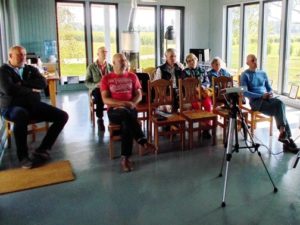
Experiences with organic blackcurrant growing
First of all, Andris explained his business in blackcurrants. Latvia produces over 2.000 tons per year. He himself produces 15-20% of it. As I understood he’s one of the bigger organic farmers in the country and selling organic seedlings to many others.His strictly organic planting and the experiences that Andris made on the Krogzeme farm during the past ten years were the most interesting points of the morning session. Even more because none of the guests has ever done it so far. Nobody had any experience with handling an organic plantation.
Weeding – a major issue for organic growers
Given the fact that almost no pest protection with pesticides and herbicides is possible, the main issue in organic berry production becomes the mechanical weeding after planting the bushes. This is mainly done by a wide range of machines. As a matter of fact, it makes it very labour intensive and expensive. Andris vividly explained the operations of several machines and his experiences with them.
Economic aspects
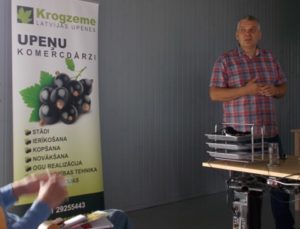 Further items of the morning theoretical part were the economic aspects of organic production. This does not look so bad in the country. Prices are 50-70% higher than conventional blackcurrants. And in general, Andris is able to sell his whole yield with a margin, as he told us. This is not only a question of the scale of his production. For the guests of the Krogzeme farm, it was interesting to hear about the cost of his organic plantation in comparison to conventional production. In fact, growers in Latvia receive a payment of approximately 775 EUR/ ha for organic blackcurrant planting.
Further items of the morning theoretical part were the economic aspects of organic production. This does not look so bad in the country. Prices are 50-70% higher than conventional blackcurrants. And in general, Andris is able to sell his whole yield with a margin, as he told us. This is not only a question of the scale of his production. For the guests of the Krogzeme farm, it was interesting to hear about the cost of his organic plantation in comparison to conventional production. In fact, growers in Latvia receive a payment of approximately 775 EUR/ ha for organic blackcurrant planting.
Latvia vs other markets
Then, Andris showed us a second presentation about his sea buckthorn production. It is under the management of his daughter, a few kilometers from his farm.The last part of the theoretical session were discussions about the Polish and the global blackcurrant market. We based our discussion on a short presentation I made. In comparison to the other markets, Latvia is a marginal market. But it feels the pressure of the Polish production and suffers from the Russian embargo.
Out in the fields of the Krogzeme organic farm
After a short break, with a very tasty lunch which Diana Krogzems had well prepared, the group went to the fields. There, the tractors were already waiting, armed with several machinery, to show us how they work.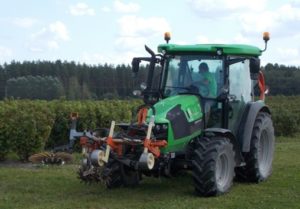
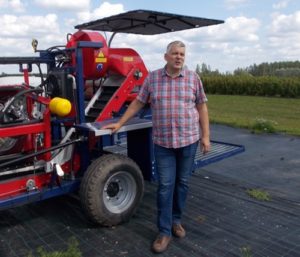
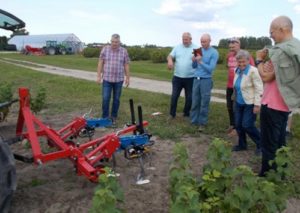 As a seller of machinery, Andris keeps himself very well informed. Mainly, he looks for all available technology to do an effective weeding of the organic bushes. He therefore showed the machinery parts according to his best experience in the fields. As an example, one tractor was weeding a row. This demonstration allowed the guests to immediately evaluate the effects of this operation.At the end, he showed us machinery for planting seedlings, for fertilizing with manure and of course for mechanical harvesting.
As a seller of machinery, Andris keeps himself very well informed. Mainly, he looks for all available technology to do an effective weeding of the organic bushes. He therefore showed the machinery parts according to his best experience in the fields. As an example, one tractor was weeding a row. This demonstration allowed the guests to immediately evaluate the effects of this operation.At the end, he showed us machinery for planting seedlings, for fertilizing with manure and of course for mechanical harvesting.
Thank you, Andris!
I would like to thank a lot Andris Krogzems and his wife for this intensive, very interesting day in Latvia and their warm hospitality. It was worth the long travel to meet him and learn about organic blackcurrant growing at his farm.
Hopefully we will meet him in Ukraine at the next IBA conference in 2020.
Mathias Ebert
Further reading:
Mathias Ebert has given a presentation of the Polish blackcurrant market at our last conference in Angers 2018.
You may consult it here